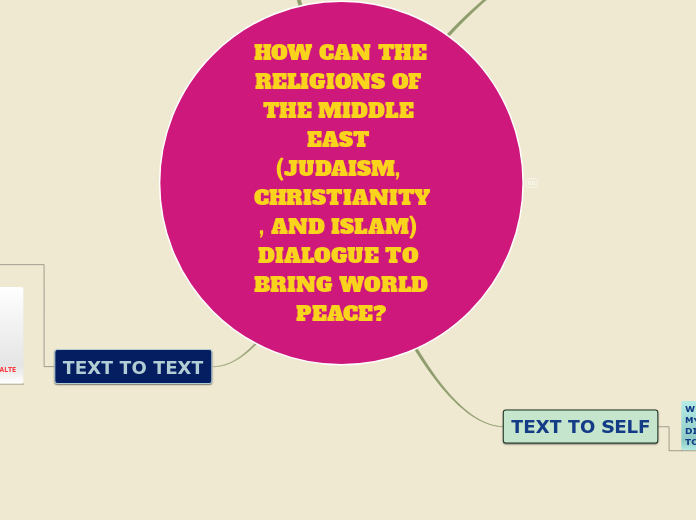HOW CAN THE RELIGIONS OF THE MIDDLE EAST (JUDAISM, CHRISTIANITY, AND ISLAM) DIALOGUE TO BRING WORLD PEACE?
TEXT TO TEXT
WHAT EXAMPLES HAVE WE LEARNED ABOUT IN CLASS OF THE ABRAHAMIC FAITHS DIALOGUING TO CREATE WORLD PEACE?
ADD MORE PICTURES AND SYMBOLS THAT REALTE TO THHE TOPIC*
THE IMAM AND THE PASTOR
This course presents a series texts and video in-formative’s which assist in displaying the Abrahamic Faiths establishing interreligious dialogue in order to inspire world peace. An example found in this course is the video; the Imam and Pastor. This video not only helps us to realize the importance of Interreligious dialogue, but it also promotes peace as it explores the conflict and the possible resolution between the Christian and Muslim faiths located in Nigeria. it portrays an excellent example of interreligious dialogue between the Abrahamic faiths as the former enemies; Pastor James Wuye and Imam Muhammad Ashafa now help promote peace and tranquility in the Muslim-Christian Interfaith Meditation Centre in their City to resolve conflicts across Nigeria. It inspires everyone to move past their differences and also show the imporatnce of the interreligious dialogue between the Abrahamic Faiths. It shows how if we separate our differences and reconcile by conversation rather than violence, then the greatest enemies can even come to an understanding and assist in inspiring others to promote peace.
TEXT TO FAITH
Why is dialogue important for these faiths? What similar beliefs, rituals, origins do the Abrahamic faiths share?
SIGNIFICANCE OF DIALOGUE
Dialogue, by itself, generally symbolizes the technique of engaging in conversation with one other, or more individuals. Dialogues mainly tend to be directed towards a controversial topic or a particular subject, where two or more individuals share their perspective and experience regarding the distinct topic. When regarding faith, dialogue is the process of communicating, understanding and accepting the various kind of religions and connecting with individuals that have different beliefs. In order to act upon God’s will it is important to realize that other religions also convey positive and worthy elements, and by understanding them, while remaining true to one’s own faith, peace is attainable. Religious dialogue promotes understanding and acceptance, which further leads to overall peace and reconciliation.
HOW DOES THIS RELATE TO ABRAHIMC FAITHS
Dialogue is a significant part in the Abrahamic faiths because each of the three religion commemorates the importance of founding peace and establishing harmony. Each of the faiths have very similar notions, however there are some rituals, beliefs and practices which makes the three religions diverse from each other, and this can cause disagreements between what is right, since each faith stands strongly upon their beliefs. Intertriginous dialogue helps religions forgive each other for mistakes made in the past and move forward by realizing that God and his messengers discuss the importance of peace and maintain healthy & positive relationships with each other, and as faithful believers, it is our duty to promote peace and spread positivity as part of our religion. Dialogue overall helps bring the three faiths much closer together and celebrate each other’s differences while sharing unique experiences establishing peace and tranquility.
Subtopic
MENTION* DIETARY RULES, MARRAIGE RITUALS, DEATH/FUNERAL COMMEMORATIONS*
SACRED TEXTS
The Abrahamic faiths each have their Holy sacred texts, being the Torah in Judaism, the Bible in Christianity, and the Quran in Islam, which the faithful refer to as instructions from God one must abide by in order to become a faithful and well mannered, as well as good person and human being. Passages from each of these books/scrolls can be read in order to spiritually connect with God and in places of worship such as the Synagogue, Church and Mosque. In this scared texts, similar narrations and principles can be found, such as the repeated idea of mercy. Overall each of these sacred texts help one determine right from wrong, give an individual insight of how to be a faithful person and become closer to God.
RITUALS
the Abrahamic faiths each have their special holy days and cultural notions in which they celebrate in order to become closer to God. (elaborate on these specifically such as Christmas, Hanukkah and Eid, which are three significant holy days celebrated in the three Abrahamic faiths) On these days, many similar activities can be examined, such as praying, gathering together in holy places, and seeking God for forgiveness and redemption showing the correspondence between the Abrahamic faiths
PRAYER
Each of the three faiths use a special way to communicate with god called prayer, where they ask God for their deepest hopes and aspirations and seek God for forgiveness and redemption. They each have sperate way to pray, like Muslims for example, who read namaz and make dua as a form of worship and prayer. While Christianity and Judaism also have special passages and texts which they refer to when praying
ELLABORATE POINTS MORE ON GOOD COPY*
Regarding the Abrahamic faiths, each of the three religions of Christianity, Judaism and Islam share very similar beliefs and have many interchangeable notions and origins. Deriving from its name, Abrahamic faith denotes from Abraham, an individual who plays a significant role in each of these three faiths origins and his constant stories can be found to be narrated from each of these three religions, showing that they all share the same origins. Moreover, we discover that when viewing other religious stories that have been narrated down in each of these three faiths can connect with the similar narrations such as Islam who shares many stories of Prophet Isa, also commonly known as Jesus in Christian faith. Christianity is also found to be deeply rooted in Judaism prominently seeing as Jesus was a Jew himself. Other various similarities can also be seen through how each of these faiths communicate with God;
- SIMILARITIES
Abrahamic Faiths Symbol
AD PICTURES AND VIDEOS ON GOOD COPY* LOTS!!
TEXT TO SELF
WHAT ARE SOME EXAMPLES FROM MY OWN LIFE OF HOW I DIALOUGE WITH OTHER FAITHS TO BRING WORLD PEACE ?
Interreligious dialogue is present as a significant aspect in my everyday life have used it as a part of my life frequently, in order to establish and maintain peace with others that do not share the same religious notions as I do. Coming from an Islamic background, I see myself practicing this principle everyday as I learn in a school which shares different beliefs. By attending a religious school and being part of a catholic community, I have the opportunity to learn and respect the similarities between my faith, Islam and Christianity, every single day. I can learn and see the similar ideas and principles while studying in religion class and being a part of MASS and can also compare my cultures and traditions along with the Catholic rituals, discovering many similarities and honouring the positive and worthy elements. I also attend a school on Sundays, which helps me learn and deepen my faith. During my time there, we take a trip during the summer each year, where we camp with fellow Christians and Jews and stay for three weeks to explore and attain information about the Synagogue, the Church and the Mosque each week. We camp together and share experiences with other children, celebrating our differences and teaching each other about special beliefs and rituals that our faith practices. This is a small development to creating peace with the Abrahamic faiths and shows each of the teens who attend, the distinctions and similarities between each of our faiths, the significance of maintain peace and also gives us the opportunity teach and strengthen our own faith. I have also used this principle throughout discussions in this course, as I exchange conversations between different individuals from each of these faiths and discuss on what makes us different as well as help educates fellow classmates about my religion and culture. Overall I find that this course provides a great reflection of how each of us practice this principle as well as helps us start creating peace, right away, with our classmates showing that it is not too difficult to establish and maintain peace with the Abrahamic Faiths and inspires us to keeping do so in the future.
TEXT TO WORLD
WHAT ARE SOME EXAMPLES OF PEOPLE OF THE ABRHAMIC FAITHS IN THE WORLD WHO DIALOGUE TO BRING WORLD PEACE?
INSERT MORE PICTURES*
PRESIDENT HALIMAH YAQUB
This report commemorates the success of a country which is developing for the better. Singapore, in attempts to lift itself out of poverty, succeeded in transforming its Third World economy, into a First World Country, caring for the dignity and Rights of Workers and displaying the results of hard work and determination help individuals to attain utmost success. Furthermore, Singapore is also working on establishing great and healthy relationships with those of other faiths, similar and contradictory to theirs by communicating and maintaining dialogue in order to sustain peace. Politicians, officials and citizens worked together to become successful, becoming an inspiration to the rest of the World and promoting interfaith dialogue and the establishment of peace. President Halimah Yaqub , part of the Islamic faith, confirms the countries unified intentions by presenting an inspiring hopeful speech where she announced; “We are here because we believe in a common ideal—that diversity in all forms, within and across societies, is a source of strength that can enrich our lives, our countries and our world. Only a cohesive society built upon mutual trust can harness the strength of its diversity, so that its people can build a better future. And this trust has to begin with a discourse anchored on cohesion, not division; on unity, not discord; on respect, not distrust; and on building bridges and common spaces, not walls and watchtowers” President Halimah shares a beautiful message as well as inspires the rest of the world to follow this as she signifies the importance of respecting other religions in order to live together as a community, and trust another, we must work to achieve peace and establish healthy bonds between other faiths, to truly result in bettering our society.
URL LINK -->









